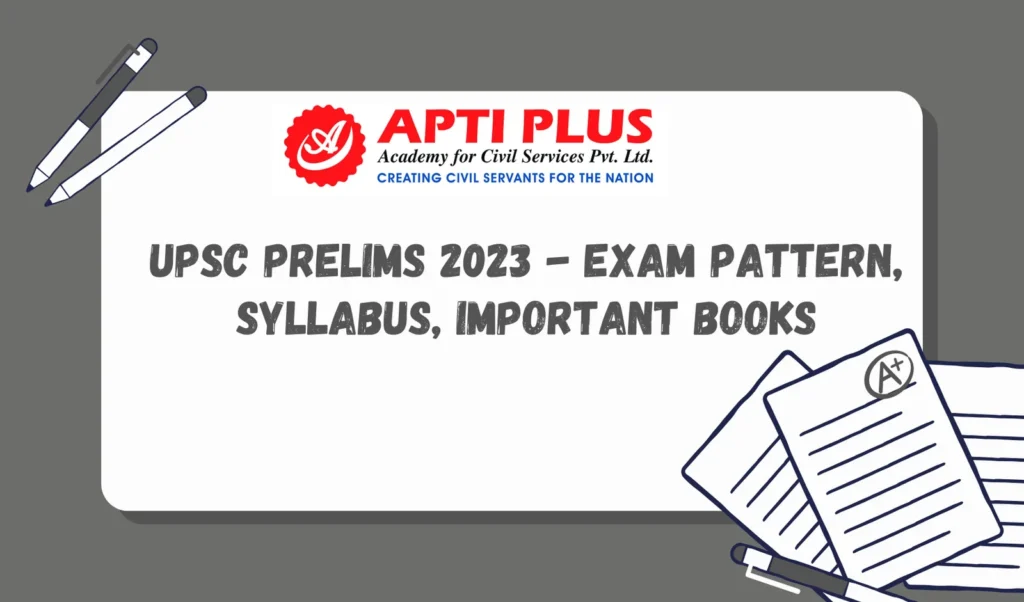UPSC Prelims 2023 – Exam Pattern, Syllabus, Important Books
Current events, and national, and worldwide events are included in the syllabus for the 2023 UPSC Prelims Exam. Indian economy and concerns connected to planning, resource mobilization, growth, development, and employment. India’s freedom movement and its history. India and the rest of the world.
The UPSC Civil Services Examination is one of the most prestigious and competitive examinations in India. Conducted by the Union Public Service Commission (UPSC), the Civil Services Examination is a three-stage selection process that includes the Preliminary Exam, Main Examination, and Personal Interview. The Preliminary Exam, also known as the Prelims, is the first stage of the selection process.
In this blog, we will discuss the UPSC exam pattern, UPSC prelims syllabus, and important books for UPSC Prelims 2023.
UPSC PRELIMS 2023 EXAM PATTERN
Below is the UPSC Prelims exam schedule according to the UPSC 2023 notification. Following the publication of the CSE 2023 notification, this page will be updated with any changes made to the upcoming UPSC paper pattern for CSE Prelims exam. On February 1, 2023, the UPSC CSE 2023 notification was made public.
| Paper Name | Time Duration | No. of Questions | Total Marks | Nature of Paper |
|---|---|---|---|---|
| GS Paper I | 2 hours | 100 | 200 | Marks considered for Preliminary Exam Merit |
| GS Paper II (CSAT) | 2 hours | 80 | 200 | Qualifying in nature |
There are two objective-type papers (General Studies I and General Studies II or CSAT) totalling 400 points in the UPSC exam pattern of Prelims. The two UPSC paper pattern are often presented in offline mode (pen-paper) during two sessions on the same day.
| UPSC Prelims Exam Pattern | General Studies I | General Studies II or CSAT |
|---|---|---|
| Number of questions | 100 | 80 |
| Negative Marking | Yes (1/3rd of the maximum marks for the question)
-0.66 marks for every incorrect answer |
Yes (1/3rd of the maximum marks for the question)
-0.83 marks for every incorrect answer |
| Duration of exam | 2 hours | 2 hours |
| UPSC Prelims 2023 Date of exam | 28th May 2023 | 28th May 2023 |
| Language of exam | English/Hindi | English/Hindi |
| Maximum marks | 200 | 200 |
| Cut Off marks | Counted for Merit. Cut-off varies every year. | 33% qualifying criteria (66 marks) |
When taking the UPSC Exam in 2022, the following considerations with regard to the UPSC Exam Pattern should be made:
- All applicants must take both the General Studies and CSAT tests in order to be eligible for the Mains.
- The Prelims score will not be factored into the final score. The Union Public Service Commission CSE Prelims in 2022 will only be used for screening.
- The Prelims question papers will be bilingual. There will be questions on it that are written in both Hindi and English.
- In both papers, there is a 1/3 deduction for each incorrect response.
UPSC Prelims syllabus
If you’re aspiring to become a civil servant and make a difference in society, then the UPSC Prelims exam is your gateway to realizing that dream. While the vastness of the IAS prelims syllabus may seem daunting at first, with the right mindset and preparation strategy, cracking the exam is well within your reach. The IAS Prelims syllabus is designed to test your knowledge and aptitude in various subjects, and as you delve deeper into each topic, you’ll not only gain a greater understanding of the subject matter but also develop critical thinking skills that are essential for success in any field. So, embrace the challenge, stay focused and motivated, and trust in your abilities to conquer the UPSC Prelims exam.
| UPSC Prelims Syllabus 2023 | Maximum Marks | Duration Of Exam |
|---|---|---|
| General Studies Paper – I
Current events of national and international importance. History of India and Indian National Movement. Indian and World Geography-Physical, Social, Economic Geography of India and the World. Indian Polity and Governance – Constitution, Political System, Panchayati Raj, Public Policy, Rights Issues, etc. Economic and Social Development – Sustainable Development, Poverty, Inclusion, Demographics, Social Sector initiatives, etc. General issues on Environmental Ecology, Biodiversity and Climate Change – that do not require subject specialisation General Science |
200 Marks | 2 Hours |
| CSAT/ General Studies Paper-II
Comprehension Interpersonal skills including communication skills Logical reasoning and analytical ability Decision-making and problem solving General mental ability Basic numeracy (numbers and their relations, orders of magnitude, etc.) – Class X level) Data interpretation (charts, graphs, tables, data sufficiency etc. – Class X level) |
200 Marks | 2 Hours |
Important Books for UPSC Prelims 2023
Choosing the right set of study materials is essential for cracking the Union Public Service Commission IAS exam. With a vast array of resources available both online and offline, it is imperative to choose the best books that cater to the exam’s requirements.
As per the suggestions of previous IAS toppers, NCERT books for prelims should be the starting point for aspirants, followed by standard reference books. However, the ideal IAS books may vary depending on the candidate’s knowledge, expertise, and preference. This article provides subject-wise recommendations from experts for the UPSC booklist.
It is crucial to select the appropriate IAS exam books online for the different stages of the Union Public Service Commission exam. The UPSC Prelims consist of objective type questions. Therefore, aspirants should be selective about their reading materials and divide their reading list into Prelims and Mains preparation.
Here are some recommended books for UPSC Prelims:
Suggestion of Important Books for UPSC Prelims
IMPORTANT BOOKS SUGGESTION FOR PRELIMS:
CURRENT AFFAIRS:
- Newspapers: Hindu, Business Line, Financial Times, Indian Express (any two)
- Monthly current affairs: IAS Gazette
- IAS GYAN website
- Down to earth, science reporter
POLITY and GOVERNANCE:
- NCERTs 9th, 10th (for basic understanding)
- Acts/Bills, judgements-PRS website
- Constitution of India at Work (Class XI) NCERT Publication
- Indian Polity by Laxmikant
- Introduction to Indian Constitution – D.D.Basu
- From Government to Governance by Kuldeep Mathur
- Ethics in Governance, ARC Report
- NITI Aayog reports, Government reports
- Governance in India by M.Karthikeyan
DEVELOPMENTAL ISSUES:
- Human Development Report & World Development Report
- Panchayati Raj in India by Kuldeep Mathur
HISTORY:
- Ancient History of India: Old NCERT by RS Sharma/ TN class 11 th book
- Medieval History of India: Old NCERT by Satish Chandra/ TN class 11 th book
- Modern History
- NCERTs
- Plassey to Partition Book
- Spectrum
- India’s Struggle for Independence – Bipan Chandra (Selective Reading)
- Indian Art and Culture
- An Introduction to Indian Art – Class XI NCERT
- Chapters related to culture in Ancient and Medieval India NCERTs
- Centre for Cultural Resource and Training (CCRT) material
- Heritage Crafts: Living Craft Traditions of India -NCERT
- Nitin Singhania book (optional)
ENVIRONMENT AND BIODIVERSITY:
- Shankar IAS Book
- Biology 12th NCERT last 4 chapters
GEOGRAPHY:
- Fundamentals of Physical Geography XI NCERT
- India: Physical Environment XI NCERT
- Fundamentals of Human Geography XII NCERT
- India: People and Economy XII NCERT
- Certificate Physical and Human Geography: GC Leong
- OXFORD Atlas
ECONOMY AND AGRICULTURE:
- Indian Economy by Ramesh Singh
- Microeconomics, Macroeconomics – NCERT Class XI, XII
- Indian Economic Development – NCERT Class XI
- Indian Economy by Sanjiv Verma
- Economics Dictionary published by Collins & Penguin
SCIENCE AND TECHNOLOGY:
- NCERT- Class 6th to 10th
- NCERT – Biology – 11th (Unit IV & V only – read basic concepts not technical details)
- NCERT Biology – 12th (Chapters 4, 5 and rest from 7 to 16)
- NCERT – Biology – 12th (OLD) – Chapter 9 onwards
- NCERT – Physics – 11th (Chap 1,5 & 8) and 12th (Chap 15 only)
- NCERT – Chemistry – 11th (Chap 1 & 14 only) and 12th (Chap 14 & 16 only)
PRELIMS SPECIFIC:
- IASGYAN Prelims Xpress Compilation
- IASGYAN Daily Prelims test
- IAS GYAN Mock tests
To start with, the NCERT books from classes 6th to 12th are essential for building a strong foundation. These books cover a wide range of topics and are written in simple language, making them easy to understand.
Apart from NCERT books, there are various subject-specific books recommended by experts. For instance, for Indian Polity, ‘Indian Polity’ by M. Laxmikanth is considered the go-to book. Similarly, for Indian Economy, ‘Indian Economy’ by Ramesh Singh is highly recommended.
UPSC exam books also provide valuable insights and analysis on current affairs and trending topics. Regular reading of newspapers like ‘The Hindu’, ‘The Indian Express’, and ‘Livemint’ along with magazines like ‘Yojana’ and ‘Kurukshetra’ can prove to be extremely helpful.
While choosing the best books for UPSC IAS exam, it is important to keep in mind the syllabus and exam pattern. The IAS prelims syllabus is vast and covers a wide range of topics. Therefore, aspirants need to carefully choose books that cover the entire IAS Prelims syllabus in a comprehensive manner.
It is important to note that simply reading the UPSC books is not enough to crack the exam. Aspirants also need to make notes, revise regularly and practice answer writing to score well in the exam.
To sum it up, selecting the best books for UPSC IAS exam is crucial for success in the exam. The right set of books will not only help build a strong foundation but also provide valuable insights and analysis on current affairs and trending topics. Therefore, aspirants need to be careful and strategic while choosing the books for their UPSC preparation.
Are NCERT books enough for IAS?
While NCERT books are an essential part of UPSC preparation, solely relying on them may not be enough to clear the IAS exam. NCERT books provide a strong foundation of knowledge in various subjects, but they do not cover the entire UPSC syllabus comprehensively.
To prepare effectively for the IAS exam, aspirants need to supplement their NCERT readings with standard reference books, newspapers, magazines, and other relevant study material. Additionally, candidates must also develop analytical and critical thinking skills, as the UPSC exam requires the ability to analyze and comprehend complex information.
In short, while NCERT books are a good starting point, they are not sufficient for IAS preparation on their own. Aspirants should use them as a base and then build upon their knowledge by incorporating other relevant study material.
Optimizing the Use of UPSC Books: Tips and Tricks
Preparing for the UPSC exam is no cakewalk, and with the vast syllabus, it is important to make the best use of the suggested UPSC books. Here are some tips to help you make the most of your study materials:
- Choose books carefully: With so many books available in the market, it is important to select only the most relevant and high-quality ones. Reading substandard books could lead to a waste of time and resources.
- Take notes: While reading from the suggested IAS books, it is advisable to take notes. This will help you retain the information and revise it effectively.
- Focus on essential books: Some books, such as Laxmikanth and NCERT books, are essential for UPSC preparation. These books are tailor-made for the UPSC exams and are crucial for subjects such as polity.
- Utilize notes-based books: There are books available that provide information in a “notes”-like format. These books can be particularly useful as they already provide you with the notes you need to prepare for the exam.
- Stick to UPSC-relevant books: While a book may be well-written and informative, it may not be relevant to the UPSC exam. Therefore, it is important to prioritize books that are relevant from the UPSC preparation standpoint.
- Refer to multiple sources: It is always advisable to read from multiple sources to gain a comprehensive understanding of a subject. However, make sure that the books you choose are from reliable sources and do not contradict one another.
- Practice answer writing: The UPSC exam includes both objective and descriptive questions. To excel in the latter, it is important to practice answer writing. This can be done by referring to previous year question papers and mock tests.
Conclusion
The UPSC Prelims 2023 examination is a crucial step towards becoming a civil servant. It is important to have a proper understanding of the exam pattern and syllabus, as well as to choose the right study material. With proper planning and preparation, you can crack the UPSC Prelims 2023 and move one step closer towards your dream of becoming a civil servant.








